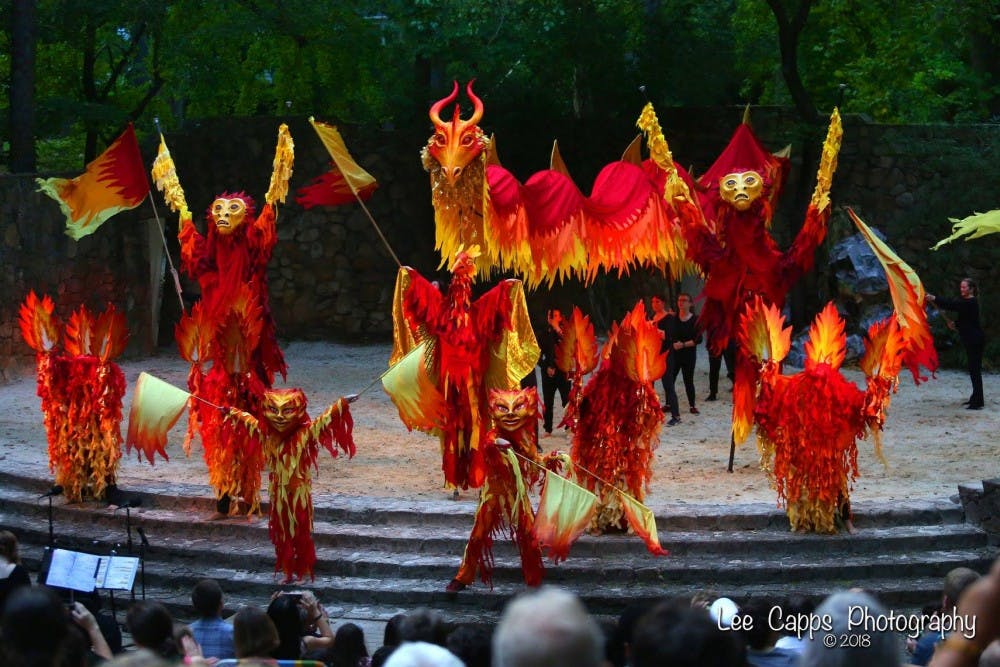Paperhand Puppet Intervention, a puppet theater company based in Saxapahaw, is in the midst of performing their 19th annual puppet pageant, "In the Heart Of the Fire."
Senior writer Karyn Hladik-Brown spoke with Donovan Zimmerman, co-founder and co-director of Paperhand, about the creation of Paperhand, this year's pageant and the relationship between fire and stories.
The Daily Tar Heel: Can you tell me about how Paperhand came to be?
Donovan Zimmerman: I was doing my own mask-making up in New England. I was living there for a while in Connecticut, and I had become friends with Jan Burger, who's the co-founder and co-director. We had met through this thing called the Haw River Festival, which is an environmental education-based festival that is for fourth graders and it runs for three weeks and people camp out — the folks camp out and then the schools get bused in. So he and I met there and he was doing wood blocks and other stuff and then he just one year said, "Come on down this year if you're not busy and we can make a puppet show for that festival."
So I came down and we made our first show — that must've been in '98 maybe — and we just, you know basically it was a hit and people loved it and we made another one the next year and then we continued to just try to start building stuff, we just kept riding the wave further after the festival would happen and keep making stuff and doing shows at other little local venues, and then we did our first Forest Theatre show in 2000 — my daughter just said, "That was a long time ago." That's pretty much how it started, he and I collaborating and sharing a vision for basically taking our activism and turning it into our art.
DTH: Can you talk more about turning activism into art? Is that the group's mission?
DZ: Part of it. You know, we called it an "intervention" because we want our work to be a wake-up call and a sort of interruption of the status quo. You know everything from dismantling racism and white supremacy to environmental justice, which was a huge centerpiece for our themes over the years. Just getting people to reawaken to their connection with the Earth and their reverence for this sort of miraculous world that we live in, and not just ignore it while it slowly got destroyed more quickly. We certainly were involved with tons of marches and direct actions and stuff all over, more so in the beginning, but we're doing a different type of activism now. But within our work we really try to make the activism a little more accessible and subtle by having the stories lead you toward a place where you feel more, in a sentence. You know as a way to counter some of the numbing behaviors and disassociating ways that humans tend to engage these days. So for us it's about that awakening and engagement with your community and with the world, and we found ways to do that through storytelling and just inspiring people within our shows. At least that's the hope.
DTH: Does "In the Heart of the Fire" have a particular message you're trying to send, or themes you're trying to get across?
DZ: "In the Heart of the Fire" is basically an exploration of fire and how fire relates to story and how that all relates to the human heart — that's why we called it "In the Heart of the Fire." We just find endless fascination with the duality of paradoxical nature of fire and story and how they relate to each other and how they relate to human beings, because they're absolutely necessary and they're vital and they provide us with a moral code and also with light and warmth and all the things we gather around the fire for. But it can also burn us and destroy our communities, so it's about the dualistic nature of those things, and so we want to take a look at that and we sort of focus on the idea of the good fire and that the good fire is our courage and our passion and our connection to the world, and that what we want to do is keep that fire kindled, the fire that's burning within each of us. That's the core of what we're doing onstage.



